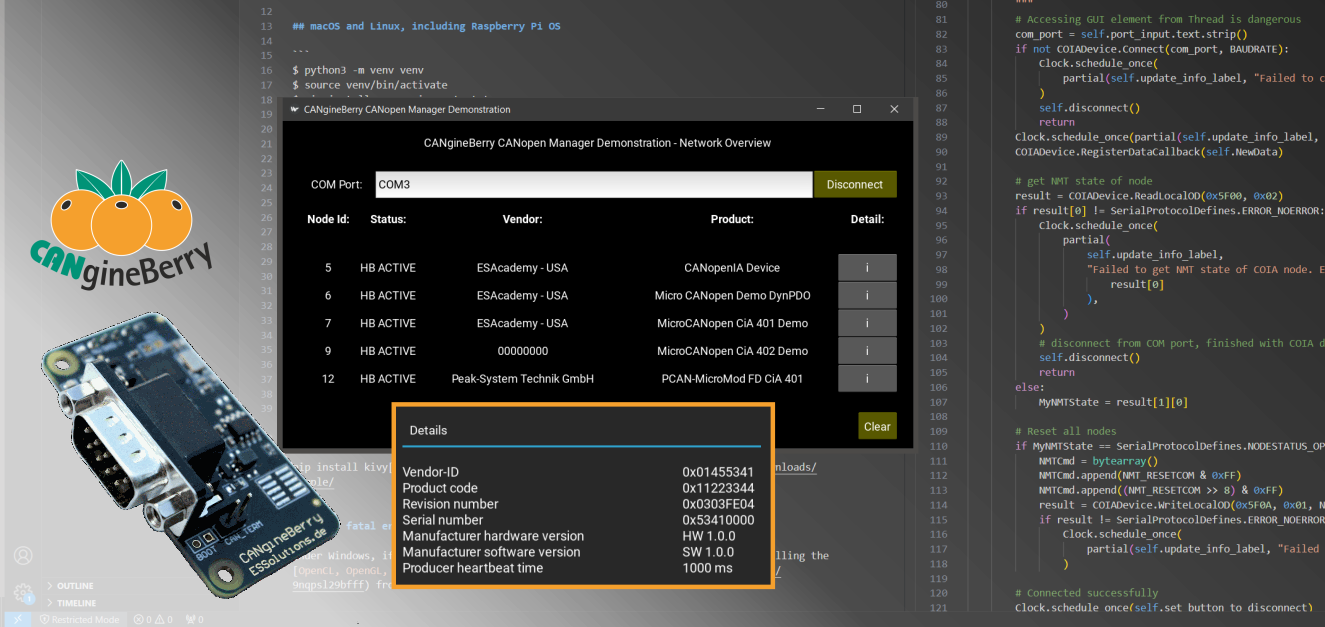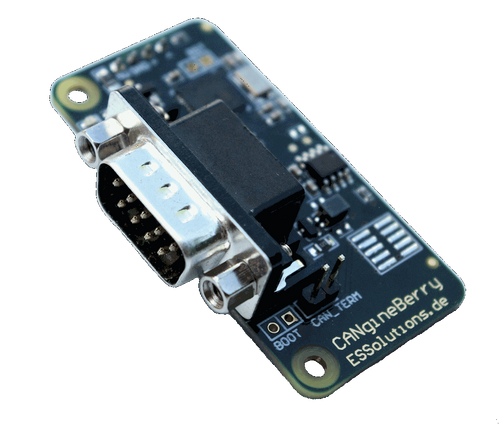Blog
Recent Posts
Python Code Example for CANgineBerry’s CANopen Manager
Posted by on
 Embedded Systems Academy has released a new software update for the CANgineBerry. This update includes a Python example designed to streamline network management for developers using Linux, Windows, and macOS. The example utilizes the provided CANopen Manager firmware to visualize and efficiently manage devices on a CANopen network.
Embedded Systems Academy has released a new software update for the CANgineBerry. This update includes a Python example designed to streamline network management for developers using Linux, Windows, and macOS. The example utilizes the provided CANopen Manager firmware to visualize and efficiently manage devices on a CANopen network.
The CANgineBerry goes beyond basic CAN interfaces by handling the complete CANopen Manager functionality. This means the module can automatically scan the network, detect new devices, and set up the necessary Process Data Objects (PDOs) without manual intervention. With this automated feature, users can easily access the Object Dictionary entries for the Manager and the connected devices, eliminating the need to write complex code.
The Python example demonstrates these features using a simple graphical user interface (GUI). When connected to a CANgineBerry, the script accesses detected devices, retrieves their details as needed, and presents them in an easy-to-understand display. This tool allows quick access to multiple devices on your CANopen network, whether yoing Linux, macOS, or Windows.
By Developers can focus on higher-level application development by delegating low-level CANopen management tasks to the CANgineBerryhe Python-based GUI, which makes configuring and monitoring CANopen networks easy and provides instant control over devices.
This update strengthens CANgineBerry’s position as more than a CAN bus interface. It remains a robust solution that simplifies CANopen network management, offering flexibility and user-friendliness for embedded systems developers.
To download the example, go to: https://cangineberry.com/
 CANgineBerry - CANopen Module for Raspberry Pi
CANgineBerry - CANopen Module for Raspberry Pi
The CANgineBerry for CANopen is an active CAN Bus co-processor module that uses a regular UART communication channel toward the host system. With its independent 32-bit microcontroller, the CANgineBerry can efficiently execute CAN Bus protocols with challenging timing demands, such as CANcrypt or CANopen, with response times of under 10 ms.
Depending on the configuration, the CAN Bus communication can run within 50 ms after power-on, even if the host system takes significantly longer to boot. More information...
Advanced IoT Programming Using The Raspberry Pi 4 And Python 3
Python is an interpreted, object-oriented, high-level programming language with dynamic semantics. Its high-level built-in data structures, combined with dynamic typing and dynamic binding, made it very attractive for Rapid Application Development. It is used as a scripting or glue language to connect existing components. Python's simple, easy-to-learn syntax emphasizes readability and therefore reduces the cost of [...]
Sensor Networks with XBee, Raspberry Pi, and Arduino: Sensing the World with Python and MicroPython
This book explains how to build sensor networks with Python and MicroPython using XBee radio modules, Raspberry Pi, and Arduino boards. This revised and updated edition will put all of these technologies together to form a sensor network and show you how to turn your Raspberry Pi into a MySQL database server to save sensor data. The reader [...]
Raspberry Pi 4 Step-By-Step Guides To Innovative Linux Projects
RASPBERRY PI 4 COMPLETE MANUAL: A Step-by-Step Guide to the New Raspberry Pi 4 and Set Up Innovative ProjectsThe Raspberry Pi 4 can accomplish a remarkable variety of embedded applications. Amateur technology enthusiasts use Raspberry Pi boards as media centers, file servers, retro games consoles, routers, and network-level ad-blockers, for starters. However, that is just [...]
USB-to-CAN Gateway With Isolated CAN Bus Port Supports Programming In C, C#, Python
IXXAT, a subsidiary of HMS Networks, has introduced their USB-to-CAN adapter called SimplyCAN, which allows the diagnosis, configuration, and commissioning of devices and systems operating in a CAN Bus network via an API without the need for driver installation.The CAN Bus gateway is suitable for mobile and stationary use. The CAN Bus port is galvanically isolated and accessible [...]
PICAN2 - Raspberry Pi CAN Bus HAT Supports SocketCAN and Python Programming
The PICAN2 board provides Controller Area Network (CAN) Bus capabilities for the Raspberry Pi. It uses the Microchip MCP2515 CAN controller with MCP2551 CAN transceiver. The CAN Bus connection is via DB9 or 3-way screw terminal. The board is also available with a 5 VDC 1 Amp SMPS (Switch Mode Power Supply) that can power the Raspberry Pi via [...]
Thermocouple Measurement HAT Adds Industrial Temperature Measurement To The Raspberry Pi Platform
Measurement Computing Corporation has announced the release of their MCC 134 thermocouple measurement HAT for Raspberry Pi. The MCC 134 brings industrial temperature measurement capabilities to the vastly popular Raspberry Pi platform. The device comes with four thermocouples (TC) inputs capable of measuring popular TC types, such as J, K, R, S, T, N, E, and B. [...]
Python Hands-On Guide For Writing Effective And Idiomatic Code
Python’s ease-of-use supports every engineer to become productive instantly, but this usually implies that they are not using all the features it has to offer. With this hands-on guide, you discover how to write robust, idiomatic Python code by leveraging its best, and probably most overlooked features. Author Luciano Ramalho takes the reader through Python’s core language features [...]
Use Powerful Python Libraries To Implement Machine Learning And Deep Learning
Machine learning is starting to dominate the software world, and now deep learning is reaching machine learning. Experience and perform at the cutting edge of machine learning, neural networks, and deep learning with this second edition of Sebastian Raschka's bestselling book, Python Machine Learning. Thoroughly updated using the latest Python open source libraries, this book offers useful [...]
Raspberry Pi Cookbooks For Python Programming Plus Software and Hardware Solutions
With millions of new users and several new models, the Raspberry Pi ecosystem continues to grow, along with new questions about the Raspberry Pi’s capabilities. The second edition of this favorite cookbook provides more than 240 hands-on recipes for running this small, low-cost computer with Linux, programming it with Python, and hooking up sensors, motors, and [...]
 Loading... Please wait...
Loading... Please wait...
